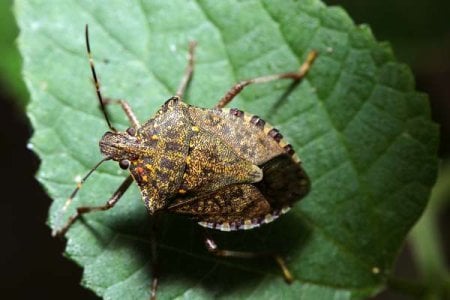Trade winds blow trouble: Australia gears up for new biosecurity battles
- Replies 30
Australia's unique ecosystem is a national treasure, but it's under threat from a host of invasive species that could hitch a ride on global trade winds and change the landscape as we know it.
As our nation prepares to defend against these biosecurity risks, it's crucial for us to understand what's at stake and how it might affect our beloved flora and fauna.
Australia is bracing for new biosecurity risks from invasive species due to anticipated changes in its trading partners.
Researchers are concentrating on five specific insects and molluscs that might enter the country via contaminated shipments, such as motor vehicle parts and food products.

The federal Department of Agriculture (DAFF) has received modelling from Melbourne University's Centre of Excellence for Biosecurity Risk Analysis (CEBRA) that examines the direct effects of climate change.
This technology could also be adapted to predict other factors, including shifts in trade patterns or even the potential election of Donald Trump in the United States.
‘Being aware of long-term shifting trade patterns and pathways helps focus research, preparation and planning for biosecurity risks,’ a DAFF spokesperson stated.
DAFF has been receiving regular updates from CEBRA on several biosecurity threats, including the spongy moth, Asian honeybee, giant African snails, and khapra beetles.
However, the brown marmorated stink bug is of particular concern due to its threat to 300 types of fruit, ornamental trees, and vegetable crops.
This pest is notorious for hitching rides in cargo, especially imports from the northern hemisphere between September and April.
Preventing the establishment of this small brown bug in Australia is also a priority for the NSW Department of Primary Industries (DPRID), which has addressed several detections near the border this year.
‘These detections were associated with imports and one report of brown marmorated stink bug found in a traveller’s luggage. Response activities involved surveillance, which confirmed there were no other brown marmorated stink bugs in the environment,’ a spokesperson said.
Australia offers extensive potential habitats for the brown marmorated stink bug, but CEBRA modelling suggests that by 2100, suitable habitats will likely be limited to the east coast.
While climate change is expected to reduce the pest's presence in Europe and the United States, its range might increase in Russia and Canada.
This insight will enable DAFF to concentrate on cargo with the highest biosecurity risks, given the country's limited resources to address the issue.
This is crucial as, in May, CEBRA biosecurity expert Professor Tom Kompas alerted DAFF to the growing risk of pest species invading Australia.
The primary factors contributing to this increased risk include rising trade volumes, shifts in species distribution due to climate change, and changes in human movement, such as tourism.
In May, Kompas directly addressed the effects of global warming, telling DAFF that ‘there are serious issues here’ as temperatures continue to rise.
The modelling forecasts ‘dramatic’ shifts in Australia's imports, with increases from Europe and decreases from New Zealand, the United States, and Asia, especially China and India.
Additionally, Australia is projected to significantly boost its exports to New Zealand.
‘These changes in trade patterns allow you to predict what the pest pathways would be from source countries,’ Kompas added.
As Australia ramps up its efforts to guard against emerging biosecurity threats, the focus on safeguarding the nation's agricultural sector is more crucial than ever.
With new risks on the horizon, including potential invasive species and shifting trade patterns, the country must remain vigilant.
This heightened awareness is especially pertinent in light of recent concerns over a specific threat to Australia’s vegetable industry.
One such issue involves a dangerous virus jeopardising a key part of the country’s $5.8 billion vegetable sector, highlighting the ongoing challenges in maintaining biosecurity and protecting vital industries.
 Have you noticed any changes in your local environment that could be attributed to invasive species? Share your experiences and join the conversation below.
Have you noticed any changes in your local environment that could be attributed to invasive species? Share your experiences and join the conversation below.
As our nation prepares to defend against these biosecurity risks, it's crucial for us to understand what's at stake and how it might affect our beloved flora and fauna.
Australia is bracing for new biosecurity risks from invasive species due to anticipated changes in its trading partners.
Researchers are concentrating on five specific insects and molluscs that might enter the country via contaminated shipments, such as motor vehicle parts and food products.

Australia is preparing to defend against five invasive species potentially arriving through international trade. Credit: Shutterstock
The federal Department of Agriculture (DAFF) has received modelling from Melbourne University's Centre of Excellence for Biosecurity Risk Analysis (CEBRA) that examines the direct effects of climate change.
This technology could also be adapted to predict other factors, including shifts in trade patterns or even the potential election of Donald Trump in the United States.
‘Being aware of long-term shifting trade patterns and pathways helps focus research, preparation and planning for biosecurity risks,’ a DAFF spokesperson stated.
DAFF has been receiving regular updates from CEBRA on several biosecurity threats, including the spongy moth, Asian honeybee, giant African snails, and khapra beetles.
However, the brown marmorated stink bug is of particular concern due to its threat to 300 types of fruit, ornamental trees, and vegetable crops.
This pest is notorious for hitching rides in cargo, especially imports from the northern hemisphere between September and April.
Preventing the establishment of this small brown bug in Australia is also a priority for the NSW Department of Primary Industries (DPRID), which has addressed several detections near the border this year.
‘These detections were associated with imports and one report of brown marmorated stink bug found in a traveller’s luggage. Response activities involved surveillance, which confirmed there were no other brown marmorated stink bugs in the environment,’ a spokesperson said.
Australia offers extensive potential habitats for the brown marmorated stink bug, but CEBRA modelling suggests that by 2100, suitable habitats will likely be limited to the east coast.
While climate change is expected to reduce the pest's presence in Europe and the United States, its range might increase in Russia and Canada.
This insight will enable DAFF to concentrate on cargo with the highest biosecurity risks, given the country's limited resources to address the issue.
This is crucial as, in May, CEBRA biosecurity expert Professor Tom Kompas alerted DAFF to the growing risk of pest species invading Australia.
The primary factors contributing to this increased risk include rising trade volumes, shifts in species distribution due to climate change, and changes in human movement, such as tourism.
In May, Kompas directly addressed the effects of global warming, telling DAFF that ‘there are serious issues here’ as temperatures continue to rise.
The modelling forecasts ‘dramatic’ shifts in Australia's imports, with increases from Europe and decreases from New Zealand, the United States, and Asia, especially China and India.
Additionally, Australia is projected to significantly boost its exports to New Zealand.
‘These changes in trade patterns allow you to predict what the pest pathways would be from source countries,’ Kompas added.
As Australia ramps up its efforts to guard against emerging biosecurity threats, the focus on safeguarding the nation's agricultural sector is more crucial than ever.
With new risks on the horizon, including potential invasive species and shifting trade patterns, the country must remain vigilant.
This heightened awareness is especially pertinent in light of recent concerns over a specific threat to Australia’s vegetable industry.
One such issue involves a dangerous virus jeopardising a key part of the country’s $5.8 billion vegetable sector, highlighting the ongoing challenges in maintaining biosecurity and protecting vital industries.
Key Takeaways
- Australia is preparing to safeguard against five invasive species that could arrive through international trade.
- The pests of concern include the spongy moth, Asian honeybee, giant African snails, khapra beetles, and the brown marmorated stink bug.
- Climate change and shifting trade patterns may alter the pathways and risks associated with these invasive species.
- The Department of Agriculture has been briefed on these potential biosecurity threats and seeks to focus resources on the most significant risks.







